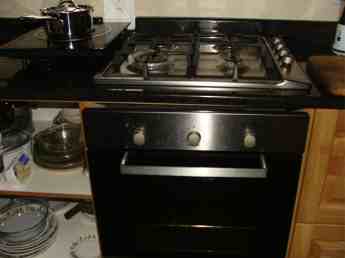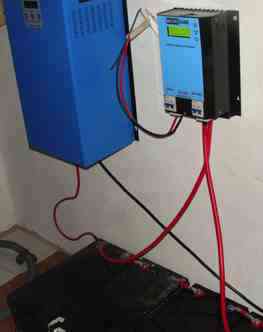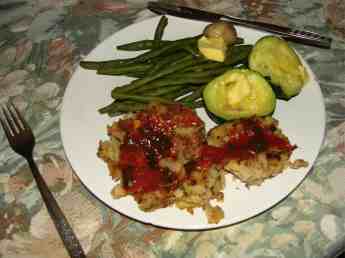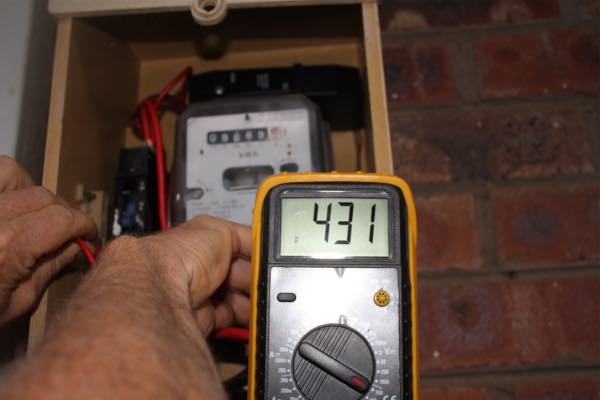Solar electric oven
Solar electric oven is not such a far fetched thought as I originally considered; when thinking about powering your home from the sun, mostly one is thinking of LED lights, your computer and perhaps the television.
That's where I started, and it was so successful that I started considering various upgrades.
My strong advice is that, like me, you will probably become enamoured, no, infatuated with the free energy from Mr Golden Sun, as my granddaughter calls him.
This page was last updated by Bernard Preston on 6th March, 2024.

Do not purchase a small inverter that you will probably upgrade at considerable unnecessary expense; go straight to the 5kW solar generator, or larger.
With the grid becoming unreliable in South Africa, and frequent rolling blackouts by the utility to prevent complete collapse, we made the decision to change over to a gas stove. But she who must be obeyed dug her heels in when it came to the oven; only electric would do.
Despite all my pleading, envisioning no baked food when the grid goes down, we chose a gas hob with an electric oven. How glad I am that I demurred to her; now we have hot food at night when the utility does its load shedding, but during the day she can bake and roast for free, and we fry and steam our vegetables mainly using the induction stove; they draw so little power and can also be energised by the solar generator.
We rarely use gas now; only for cooking at night when the utility fails.
Solar Electric Oven
Solar electric oven draws about 2.5kW of electricity.
No more waffle; back to the solar electric oven.
Modern stoves are a lot more energy efficient; whether it is induction plates on top, that use less than half the power of the old fashioned coil elements, or the electric oven that draws only 2.5kW, they are much more efficient.
Our next thought is a hob to go with our solar electric oven that uses gas and induction power[1].
Solar power energy
Solar power energy is free; it is capturing and storing it that costs money.
It is economics driving the shift to low-cost renewable electricity as it outcompetes against fossil and nuclear plants, says Tomas Kaberger, as the use of fossil fuels for generation of electricity fell whilst overall power output rose for the first time in 2019.
So if you are planning to use the sun to energise your solar electric oven, then I would recommend you go for at least a 5kW inverter; and 3,000 watts of photovoltaic panels.
If these terms mean nothing to you then go to our solar power energy page, using the search function in the navigation bar.
In short the sun's energy is captured by PV panels on the roof; the direct current is regulated by a device called a MPPT on the right and stored in batteries seen below.
An inverter on the left then steps up the voltage to 110 or 220V depending on where you live, and turns it into alternating current for normal use in your home.

This is my original system; the MPPT on the right, the inverter for home on the left and batteries below.
But that 2kW inverter is not adequate for a solar electric oven; go straight to the 5, then it hurts only once and you will not be doing an unnecessarily expensive upgrade like I had to do when we fell frantically in love with that ball of fire in the sky. He has reduced our electricity bill dramatically to a big fat zero.
Well that's a tiny exaggeration; 43kWh in four years.
In fact we have gone even more radical with a 10kW inverter for home; now we can run the solar electric oven and simultaneously mow the grass; the new west facing PV panels provide power in the afternoon when one needs more energy for the appliances.
Last night we had our first solar electric oven baked dish; pilchard fish cakes are one of my favourites. They only take half an hour, so Helen cooked them in the late afternoon when there was still adequate sunshine; and then the buttered gem squash and green beans were prepared just before supper on the induction stove using grid power from the utility. They only take five minutes in the steamer.
Up until now we have been using about 50 units of electricity per month; now, with the new lithium batteries and the baking and roasting being done in our solar electric oven done mainly during the day, we have managed to drop the mains breaker for the last month.
The material expressed on this page is gleaned from the nutritional and environmental literature; it is clearly referenced. A plain distinction is made between the author's opinion and that which is scientifically proven. When in doubt consult your health professional.
To suggest a correction or clarification, write to Dr Bernard Preston here. Contact.
Going completely off the grid was something of a pipe dream; one needed a huge bank of costly batteries. Or, accept that when you have an occasional three days of inclement weather that you will lead something of a deprived life; no hot water and no electric oven.
But now that the lithium batteries have dropped so much in price, we are contemplating going off the grid.
Even on misty days the photovolaic panels produce enough energy for lights and computers.
I am giving no advice about the batteries; there is so much research being done that by tomorrow it would be out of date; but, for it is worth, we are still using lead crystal cells and they have proved most satisfactory; after five years there's no appreciable decline.
But the lithium batteries you can drain to 15 percent of their capacity which gives them so much more oomph. They charge much faster too.
Remember lead batteries do not like being drained below 50 percent; in fact I try not to go below 80.
Newsletter
Our newsletter is entitled "create a cyan zone" at your home, preserving both yourself and Mother Earth for future generations; and the family too, of course. We promise not to spam you with daily emails promoting various products. You may get an occasional nudge to buy one of my books.
Here are the back issues.
- Lifestyle and ideal body weight
- What are ultra-processed foods?
- Investing in long-term health
- Diseases from plastic exposure
- Intensive lifestyle management for obesity has limited value
- A world largely devoid of Parkinson's Disease
- The impact of friendly bacteria in the tum on the prevention of cancer
- There's a hole in the bucket
- Everyone is talking about weight loss drugs
- Pull the sweet tooth
- If you suffer from heartburn plant a susu
- Refined maize meal and stunting
- Should agriculture and industry get priority for water and electricity?
- Nature is calling
- Mill your own flour
- Bake your own sourdough bread
- Microplastics from our water
- Alternative types of water storage
- Wear your clothes out
- Comfort foods
- Create a bee-friendly environment
- Go to bed slightly hungry
- Keep bees
- Blue zone folk are religious
- Reduce plastic waste
- Family is important
- What can go in compost?
- Grow broad beans for longevity
- Harvest and store sunshine
- Blue zone exercise
- Harvest and store your rainwater
- Create a cyan zone at your home
One thing is important though; do use only sealed batteries. You do not want toxic odours if the electrical room is in your home.
And now for a 2019 update; we have just upgraded to lithium batteries. They have come down dramatically in price, but I reserve judgement on how well they perform. Watch this space; so far better than expected. After nine months, I can confirm that the change can wholeheartedly be supported; we are very happy.
Changing the oven over to solar proved very simple. The input to the breaker was altered from the mains supply to a line from the change over switch; that enables me to toggle over from the utility to the sun in the morning when the PVs start providing about 500W and changing back in the late afternoon, all with one flick.
Purchase only the very best change over switch; our first one lasted just a year. Get advice from a local electrician.
One important issue is to also move the correct black line from the neutral mains bar to the change over switch.
Both live and neutral from mains and solar must remain completely and utterly separate.
Bernard Preston
Bernard Preston, semi retired DC finds himself as something of a solar geek; admittedly he is a physics major. There were no solar electric ovens back in those days.
Edith Wharton whom you have probably never heard of unless you're well read, had this to say.
"In spite of illness, in spite even of the arch-enemy sorrow, one can remain alive long past the usual date of disintegration if one is
- unafraid of change,
- insatiable in intellectual curiosity,
- interested in big things, and
- happy in small ways."
I had not heard of her; she was the first woman to get a Pulitzer prize.
My "big thing" on retiring was to go green and build this solar generator; it turned out not to be rocket science, but I do have a bachelor's degree in physics.
You build your big thing.
Firstly the solar powered generator upgrade; the whys and wherefores of the whole business; all about inverters, MPPTs, diodes and so on. And why, if you want to have a solar electric oven, you should go straight to a 5kW inverter or larger. I wasn't ambitious enough initially and had the unnecessary expense of an upgrade. You can be smarter and go bigger right from the start, then it hurts only once.
There's general concern about shadows fall across your panels during the day. My measurements are that we need not be overly concerned about shadows on PV panels.
Then there's the change over switch; that enables you to easily flip from the grid in the morning to solar, and back again in the late afternoon.
You will find that latest newsletter at tum sleeping; it is a very bad habit that perhaps you too need to break. It is one of the causes of arthritis in the neck.
Use the Site Search function in the navigation bar on your left to find the links to those topics highlighted in bold.
Here is that pilchard fish cakes recipe; half an hour to prepare and another thirty minutes in your solar electric oven.

This may look like a dog's breakfast, but I can assure you that you cannot get a healthier and more tasty dinner. Buttered gem squash and green beans straight from the garden and omega-3 rich pilchards with a tomato based sauce.
It is low in starch, so is perfect for our modified Banting diet. Butter is back and should never have been given the marching orders provided you have a balanced diet with foods like these.
If building a solar farm has been the big thing, then a consuming interest in growing nutritious choice foods is the smaller item. Or is it vice versa? My thoughts on backyard permaculture are what drive the whole; working with nature instead of against it.
Off the grid
Going off the grid means a big investment in batteries; or a very stable source of electricity from the utility, in which case no batteries at all are needed. Either way, there is plenty of power for a solar electric oven.
Disconnecting completely from the electrical utility is for most folk just a pipe dream; in the jargon it is known as going off the grid. Previous you had to have a vast bank of expensive batteries, and you would still have had cold showers if there is protracted inclement weather.
We are looking at installing a gas geyser before going off the grid.
Your solar electric oven is then quite useless without sunshine.
My advice is to stay connected for the rainy days. Today is the fifth wet, misty day in a row. If we were not connected to the grid, we'd be in for cold showers; the PV panels work tolerably well despite the weather, but with only enough energy for LED lights, computers and the TV.
Having said that, thanks to the hugely damaging surge in grid power, we are now entertaining the idea of going off the grid. Lithium batteries have come down in price and it has become feasible. How I am enjoying the prospect of thumbing my nose at the arrogant and grossly incompetent service provider.
However instead of cutting off my nose to spite my face we have gone onto prepaid electricity and the mains breaker remains permanently down except in an extended period of inclement weather to protect us from surges.

This power surge from the utility that caused huge damage down our street is making me again consider going off the grid.
Can solar power an electric oven?
Can solar power an electric oven? The answer is an emphatic yes. They draw around 2kW, much the same as a hot water kettle. Having said that, there is a proviso; only on a sunny day unless you have a large bank of powerful batteries.
Try to avoid using your solar electric oven at night.
Going solar comes with a change of lifestyle if you are off the grid; devices that are big current users should be only on a sunny days.
Mostly we understand this; no woman does the washing on a rainy day.
Bernard Preston books
Bernard Preston books are in the main now only available on the net via Amazon; it's the future of literature. You can download most books in a jiffy at half the price.
I build these blogs on solar power energy just because I'm interested, and would like to encourage you to do the same. We need more greenies on the planet if it's to be habitable for our grandchildren. There's nothing else in it for me. The big plus is that we now have a solar electric oven.
Do you have any idea how satisfying it was to roast a chicken yesterday using our solar electric oven, knowing that it contributed not one iota to global warming?
But if you are a bookworm and want to say thank you, you could always nestle down under a LED light and enjoy one of my Bernard Preston books.
There are two genres; the chiropractic anecdotes and another more controversial book called A Family Affair. Read the reviews.
Folk do love them, though the latter may have you scratching the pate!
I am busy now, my seventh book called "Priests Denied" but that won't be available until 2022; editing is a bear. It concerns the first married pope in a thousand years.
Did you find this page interesting? How about forwarding it to a friendly book or food junkie? Better still, a social media tick would help.
Address:
56 Groenekloof Rd,
Hilton, KZN
South Africa
Website:
https://www.bernard-preston.com